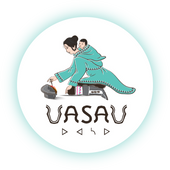The Bearded Seal
Bearded seals, along with ringed seals, are a major food source for polar bears. They are also an important food source for the Inuit of the Arctic coast. The Inuit language name for the seal is ugjuk (plural: ugjuit) or oogrook or oogruk. The Inuit preferred the ringed seal for food and light; the meat would be eaten and the blubber burnt in the kudlik (stone lamp). The skin of the bearded seal is tougher than regular seal and was used to make shoes, whips, dog sled harnesses, to cover a wooden frame boat, the Umiak and in constructing summer tents known as tupiq.
Seal fat has been called the “natural penicillin” of the North and it seems true; it is used more than any other animal or plant part in traditional medicine. It is more useful, effective and common than other animal fats such as caribou and bear, and can be used raw, boiled or even rancid. When a seal is killed, the fat destined for medicinal use is sliced up fine and not pressed. One tries to pick the part that holds the most oil, usually the neck in summer and the hips in winter. The fat must be clean, without meat, blood or dust.
Though the species of seal is not usually important, bearded seal fat seems to be preferred, and the younger the better. Generally, one uses fat from a male seal on women and female seal fat on men.
Raw seal fat is often used to treat skin ailments. Applied in thin slices or rubbed in, it is effective on cuts, burns, wounds and impetigo, and helps stop bleeding. Raw seal fat can also be chewed (for a sore throat) and used in drops (in the eyes for snow blindness and in the ear for earache). Here is an example of how well it can work.
Seal fat can also be boiled. Some people boil it until it is black – “the longer you cook it, the stronger it gets,” someone told us. When boiling, the temperature is tested with a birdwing feather. The outer end is placed in the oil and if it burns, the oil is ready. Boiled fat can be preserved by putting it in airtight animal parts (stomach, throat, flippers) and stored in a cool place. Taken internally by the spoonful, this fat is as good as cough syrup and eases breathing. Rubbed on the skin, sometimes mixed with some Labrador tea, it is good for treating frostbite, chest colds and general aches, but it must be absorbed in order to be effective.
Rancid seal fat can be chewed and mixed with ptarmigan down for use on cuts, or as drops to treat earache.
